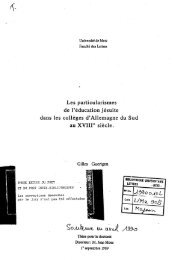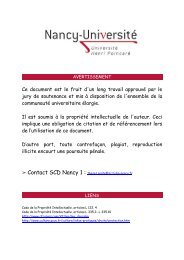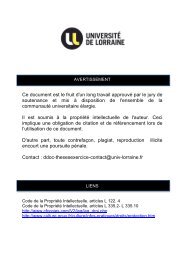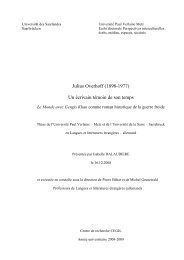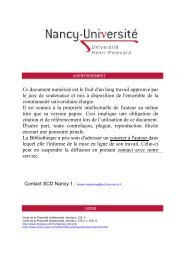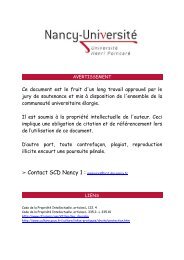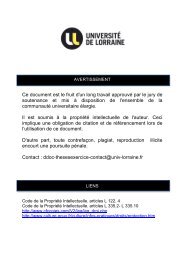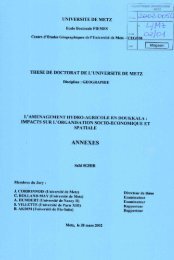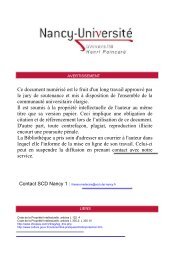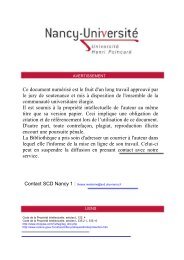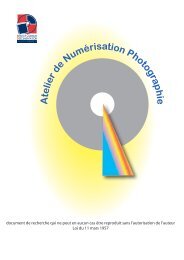Codes : - Bibliothèques de l'Université de Lorraine
Codes : - Bibliothèques de l'Université de Lorraine
Codes : - Bibliothèques de l'Université de Lorraine
Create successful ePaper yourself
Turn your PDF publications into a flip-book with our unique Google optimized e-Paper software.
• Introducteurs neutres : lauten, heißen<br />
• Introducteurs stricts : äußern, sagen=äußern<br />
• Introducteurs exécutifs, fixant le mo<strong>de</strong> d’émission : sagen=sprechen, schreiben, <strong>de</strong>nken<br />
• Introducteurs communicatifs marquant l’intention communicative et influant sur l’ordre morphosyntaxique<br />
et linéaire : sagen=mitteilen, fragen, befehlen<br />
• Introducteurs topologiques :<br />
o Relatifs au sectionnement <strong>de</strong> STx, marquant<br />
• L’ouverture : beginnen, anheben, losschreien<br />
• La clôture : en<strong>de</strong>n, schließen<br />
• Le mo<strong>de</strong> <strong>de</strong> succession : unterbrechen, fortfahren<br />
o Relatifs au déclenchement et à l’interdépendance <strong>de</strong>s étapes <strong>de</strong> STx, marquant<br />
• La réaction à une étape : antworten, erwi<strong>de</strong>rn, entgegenen, versetzen<br />
• Un stimulus ou la requête d’un acte <strong>de</strong> parole : fragen, wissen wollen, sich<br />
erkundigen<br />
• La présence <strong>de</strong> plusieurs locuteurs alternants : sich unterhalten, diskutieren,<br />
<strong>de</strong>battieren, streiten<br />
• Introducteurs psycho-spirituels activant un conditionnement « intérieur » <strong>de</strong> LO<br />
o Dans le domaine noétique, argumentatif : <strong>de</strong>nken, glauben, überre<strong>de</strong>n, wi<strong>de</strong>rlegen, zu<br />
be<strong>de</strong>nken geben<br />
o Dans le domaine émotionnel : bedauern, grollen, geifern<br />
• Introducteurs phoniques : flüstern, raunen, rufen, brüllen, knurren, kreischen<br />
• Introducteurs contextuels<br />
Le point commun <strong>de</strong>s analyses rési<strong>de</strong> dans la valeur <strong>de</strong> neutralité accordée à sagen 48 et dire.<br />
Sagen gehört neben re<strong>de</strong>n, sprechen, und (sich) äußern zu <strong>de</strong>n semantisch unspezifischen verba<br />
dicendi, mit <strong>de</strong>m in seiner prototypischen Be<strong>de</strong>utung auf Situationen <strong>de</strong>s monologisch perspektivierten<br />
und propositional spezifizierten Äußerns Bezug genommen wird, wobei es für die Art und Weise <strong>de</strong>s<br />
propositionalen Gehalts keinerlei Restriktionen gibt. Insofern impliziert je<strong>de</strong>s spezifischere<br />
Sprechaktverb das unspezifische sagen [...], und umgekehrt kann mit sagen zusammen mit<br />
entsprechen<strong>de</strong>n Komplementsätzen, die spezifische propositionale Gehalte ausdrücken, auf bestimmte<br />
Sprechakte Bezug genommen wer<strong>de</strong>n [...]. (Harras 2001 : 169)<br />
1.4.3 Le mo<strong>de</strong> indirect<br />
Le mo<strong>de</strong> indirect est le mo<strong>de</strong> dans lequel le cadre énonciatif <strong>de</strong> l’énonciateur citant domine<br />
le cadre <strong>de</strong> l’énonciateur cité ou est entremêlé à celui-ci. Selon le <strong>de</strong>gré d’intervention <strong>de</strong><br />
l’énonciateur citant et l’intégration syntaxique du discours cité au discours cadre, on<br />
distingue le discours narrativisé (1.4.3.1), le discours indirect régi (1.4.3.2), un type<br />
spécifique à l’allemand, l’einführungslose indirekte Re<strong>de</strong> (1.4.3.3), et le discours indirect<br />
libre (1.4.3.4). Cette <strong>de</strong>rnière partie nous amènera à nous interroger sur les frontières du<br />
discours indirect libre (1.4.3.5).<br />
1.4.3.1 Le discours narrativisé<br />
Le discours second se présente sous sa forme la plus sommaire comme discours narrativisé.<br />
48 Il s’agit <strong>de</strong> sagen synonyme <strong>de</strong> sich äußern. Voir l’analyse componentielle <strong>de</strong> sagen dans Marschall (1995 :<br />
361 ss).<br />
- 53 -



